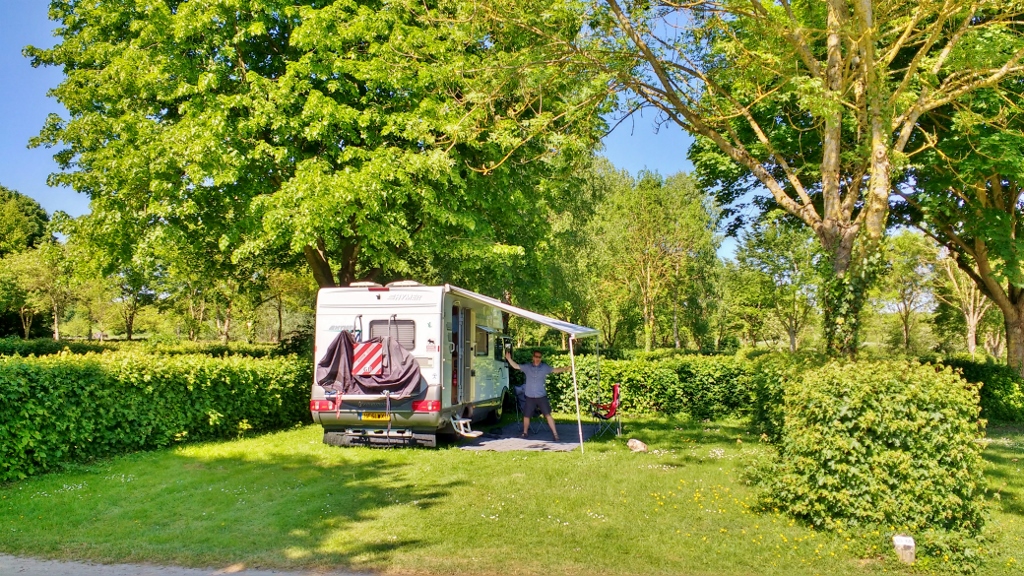Travelling with a Dog
Update: This blog post is from 2011 and while a lot of it is still correct, we have now archived it and replaced it with a more up to date articles about travelling with your dog and also travelling with an old or ill dog.
We travel with our King Charles Cavalier Spaniel, imaginatively named ‘Charlie’. We’ve been to France, Germany, Belgium, Morocco, Portugal and Spain with him, and plan to take him to lots more EU and non-EU countries. We enjoy our time with Charlie – he’s been the starting point for many broken English conversations with the locals and is a good walking companion, when he can be bothered.
 Please note: we’re not vets, or lawyers, more’s the pitty. We’d strongly advise that you visit your local vet for advice on treating your dog for fleas, ticks, worms, leishmaniasis, rabies and other problems. Your vet will also be in a good position to advise on the EU Pet Passport scheme.
Please note: we’re not vets, or lawyers, more’s the pitty. We’d strongly advise that you visit your local vet for advice on treating your dog for fleas, ticks, worms, leishmaniasis, rabies and other problems. Your vet will also be in a good position to advise on the EU Pet Passport scheme.
Our tips for travelling with a dog:
-
- Pet Passport: You’ll need a Pet Passport to take your dog outside the UK, and to get him or her back in again. The scheme’s managed by DEFRA in the UK, and you’ll need to head up to your vets to get your dog microchipped, vaccinated against rabies (with a subsequent test at least 30 days afterwards to proved it worked) and the Pet Passport issued. When coming back into the UK you need to get a vet abroad to treat your pooch for tapeworm within 5 days of coming back, and wait at least 24 hours after the treatment before re-entering. The Passport also enables you to bring your dog back into the EU from non-EU countries like Morocco. The scheme changed on 1 Jan 2012, and will probably change again at some point, ask your vet and have a read though DEFRA’s site for the latest info.
- Insurance: We tried and failed to get insurance for Charlie which covered him for 12 months travel outside the UK. It wasn’t about price, we couldn’t find anyone who would sell us a policy. Our view is there are plenty of vets in Europe and if we have a problem, we’ll get him to one. So far our only trips to a vets have been to get his worm treatment for travel back to the UK, and for booster jabs, and the standard of service was excellent.
- Theft: Charlie has to stay in the van sometimes, usually when we head into a supermarket, but also if we go into an attraction which doesn’t allow dogs, or into a restaurant (neither of which we do very often, sadly). The longest he’s been left alone has been a full day, parked up on a campsite in Fes, Morocco. There remains a risk the van will be stolen and they’ll take Charlie. We take security precautions, and we feel the biggest one is being choosy about where we park and when – avoiding cities and tourist attraction car parks mainly. We don’t leave Charlie outside shops that he can’t go in, if we do both need to go in we take it in turns (we once leave him outside a McDonalds, as we sat on the other side of the window right next to the door – but he wasn’t happy). On the whole, we’ve felt pretty secure in France, Portugal, Spain and Morocco and feel this risk is a small one.
- Travelling: Stupid question maybe, but seriously, is your dog a good traveller? Charlie will sleep for a couple of hours on a car journey, making no fuss at all, and we don’t tend to travel much further than that each day on the van. On the rare day we do a longer stint, like 4 hours, we make sure we stop somewhere for a walk and loo break.
- Food: Charlie had dry skin, and would scratch himself a fair bit back in the UK. Our vet suggested hypo-allergenic dry and wet dog food, which we fed him for a year or two. We were worried that we’d not be able to get this abroad, but we’ve since been feeding him the cheapest dry dog food available for about 4 months (from Lidl, about €5 for a 10Kg bag). He loves it and we’ve noticed no skin problems.
- Messing Up the Van: Charlie has a great habit of bringing sand and dirt into our van, despite our efforts to towel him down. He’s allowed on the seats (but not the bed), and we’ve got loose washable covers on all of them so we can clean the place up every now and again. We keep Charlie’s fur cut short to help reduce shedding in the van, to keep him cool in hot countries and to make him easier to wash. We carry some hair clippers for this, which double up as hair trimmers for Jay. They only work on mains though (or our 300W DC to AC inverter).
- Warmth: It gets quite cold in the main living area of our van at night. We once woke up to find Charlie physically shivering in the morning. Julie’s since made him a sleeping bag which we pop him in when we go to bed. If he gets too hot he climbs out and sometimes we have to get up in the night and put him back in, or at least cover him with a blanket. If it gets really cold, we’ll leave the heating on overnight. Oh yes, we spoil our dog; if you’re not as soft as us then this will all be far less of a worry!
- Noise: Be prepared for the snoring. For a small dog, Charlie can out snore the noise of Atlantic breakers. Not much you can do about this one if your dog snores!
- Health: Not the most pleasant of subjects; but Cavaliers have a bad habit of their anal glands not emptying properly. In the UK we were happy to leave the emptying job to the vet or dog groomer. Out on the road the job is mine and the vet showed me how to do it. We have a stash of rubber gloves but have found we’ve only had to do it the once. Also, we’ve needed to get Charlie’s annual booster inoculations done while in Spain. It was really simple, we asked two vets in a Spanish town and at both they spoke English and no appointment was needed. Finally, a UK vet advised we use Advocate flea and tick treatment, but a Spanish vet told us this doesn’t protect against Leishmaniasis, which is prevalent in southern Europe, and he sold us a local treatment called ExSpot (covers fleas, ticks and Leishmaniasis). You can also get a tick collar, but we just use the ExSpot treatment – he’s had a few ticks recently, all just before the next treatment was due, and none since he was treated.
- Inconvenience: We’ve found that shops, restaurants and tourist attractions are more likely to accept dogs than in the UK. Cafes with outside areas have all accepted Charlie so far. Having said that, your dog is going to restrict where you can go. For us, the trade off is worth it. He’s a wonderful companion, and really helps break the ice with the locals.
- Beaches: unsurprisingly, dogs aren’t allowed on lots of beaches. Charlie loves them though and we’ve noticed that, out of season, the locals just ignore the no dog signs on most beaches – even a blue flag beach had the odd dog on it in April. Our approach is to keep Charlie off a beach if it is signed as ‘no dogs’, but we subsequently see the locals on the beach with their dogs, we follow suit.
- Poop: This is everywhere in some towns. We always clean up after Charlie regardless of the local approach. We’ve found many towns in France provide free poop bags – they’re next to the poop bins. The only place we don’t use bags is out in the countryside, where we can use a stick to get the poop off the path – this seems better than adding yet another plastic bag to the rubbish tips.
- Securing in Transit: dogs should be secured in transit, and we understand that this is a legal requirement in some countries. We’ll be honest: we don’t restrain Charlie and never have done. He sleeps on the seat behind the driver’s seat. If we crash, there is a risk he’ll be hurt, or will hurt us. We drive carefully and slowly to manage this risk, but we accept that the risk remains. We also accept there is a risk we may get into trouble with the police.
If we’ve missed anything, or you’ve any more questions, please don’t hesitate to ask us. As a final point: we’ve seen a great many motorhomes with dogs, cats and caged birds, all the way down to the Morocco-Algeria border. It’s normal for Europeans to travel with their pets, even flipping great huge dogs!
Cheers, Jay









Jay,
interested in knowing when you went. I want to bring Obi, our doodle-cross to Morocco but am unsure of the new regulations.
It would seem I need to get a “Third country official veterinary certificate” at most 10 days before returning to the EU; but the Passport seems to server the same function, so am unclear…
Did you go before or after the 2012 change-of-rules date?
THanks,
M
Hi Michele
We went after the rules changed on 1 Jan 2012. My understanding is that the certificate is only needed if you don’t have an EU Pet Passport. We left the EU a few times, including two trips to North Africa and one into Ukraine, and returned OK with only his PP; we could have been lucky of course. I’d suggest emailing or phoning DEFRA for the latest, official info, and getting hold of the EU legislation and reading it yourself.
Cheers and happy travels! Jay
Thanks :)
I’ve emailed DEFRA; but their responses aren’t exactly prompt! Almost makes the Moroccan border crossing seem fast…
I’ve tried looking at the Spanish side of things – as I’m worried DEFRA say “all ok”, and then I end up having trouble re-entering the EU. Problem is, my Spanish is, well… useless!
Time to spend some time on google translate!
Thanks for the info though – glad to know I’m not alone in trying to get a dog out and back in to the EU!
Might be worth checking for French camping car websites too, as thousands of French motorhomes make the trip and a good number of them take pets? Yup, DEFRA took weeks to reply to us too. Good luck! Jay
HI, I am so pleased to find your tips on travelling with a dog. We are looking at an extended break this year and our dog will be coming with us, but I have never taken him abroad before. Can I ask how your dog coped with the heat? I have a labrador and he does not appreciate it when it gets too warm. (I’m from Hucknall by the way!!!)
Hi Sarah, Hucknall, hooray! We travel through your place every working day at the moment, dropping Ju off at the tram stop.
We hit the heat mainly in the Balkans; Croatia, Bosnia and Hungary were ROASTING! Charlie survived without any ill effects but was undoubtably uncomfortable some of the time (as were we). We found the only way to be as comfortable as possible was to find full shade and stay still during the day. Charlie would get himself under the van and pant at us, enjoying some respite, so it was also much easier if we were on a campsite.
We shaved almost all his fur off, and he was hosed down or flung into the sea, under taps, dunked in rivers etc etc to cool him off. In one place in Croatia we bought a huge bag of ice and dished it out between us, holding a bag on Charlie’s back, to his double annoyance.
We always carried a lot of fresh water for him, and a fold up bowl, so he could drink himself silly, plus he could access his water while we were driving. Probably the best way to manage things would be to be a bit wiser than us (not hard) and stay north in the summer, or in the mountains, and south in the winter.
Hope this is of some help, pls ask any more questions, Jay
Hi Jay. Thanks for the info. We have our van now, and despite being complete rookies we’re off next month. In the mean time your website has been my bible!! I notice you mentioned not being able to get European insurance for your dog. I’m with a company called Healthy Pets and not only have they willingly paid out vast sums of cash for my dog over the years, they also cover 365 days in Europe.
Healthy Pets, thanks for the tip. Jay